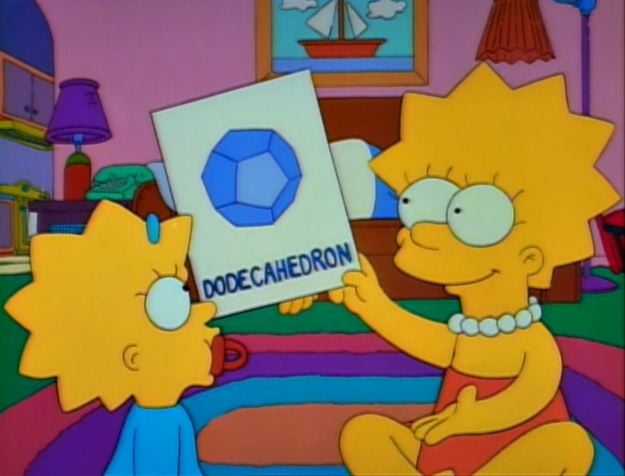
| Popular culture can reveal, reflect, and even shape how society views mathematics. Popular culture can be a powerful way to engage the public but care must be taken because stereotypical representations of mathematicians can actually be discouraging to students. The Simpsons is the longest running sitcom ever and it contains many references to subject matter and scholars from various academic fields, including mathematics. The Simpsons episode Girls Just Want to Have Sums (original airdate April 20, 2006) explored the topic of women in mathematics. |
 |
Media Coverage Related to this EpisodeA Futurama Math Conversation with Dr. Jeff Westbrook, one of the writers with a mathematical background who worked on this episode Girls Just Want to Have Sums, Association for Women in Mathematics Newsletter, Volume 36, Number 2, March-April 2006, contains details about a preliminary animatic Popular Culture and MathematicsPortrayals of Mathematically Talented Women PRIMUS Publications on Popular Culture and Mathematics Association for Women in Mathematics (AWM)Association for Women in Mathematics
|
 |
Summers displays new understanding of women's careers, Marcella Bombardieri, The Boston Globe, April 8, 2005. Note: In February, 2006, Summers announced that he will resign as president of Harvard.
Sex Difference in Intrinsic Aptitude for Mathematics and Science? A Critical Review, Elizabeth S. Spelke, Harvard University
Women in Academia: Are We Asking the Right Questions, Carolyn Gordon and Barbara Lee Keyfitz, Notices of the American Mathematical Society, August 2004, Volume 51, Number 7.
A summary of psychological research on gender and cognition
What stereotype threat is and how it can be alleviated
Subtle bias: An article about the work of psychologist Mahzarin Banaji
A couple of years ago, I was in Japan interviewing women scientists and engineers. I started out with an assumption about the role of math in keeping women out of engineering careers, because we know that girls are discouraged in the U.S. where too often math is considered not only gendered male but innate in a funny way. . . . When I referred to the math problem in Japan, nobody could figure out what I was talking about. . . . Nobody could fathom the idea that if learning higher math didn't come easily, you weren't supposed to continue. You were supposed to work harder. It became clear that Japanese women had very different career opportunities than men, but it had nothing to do with some concept of a math gene. Barbara Lazarus, 2001 in Balancing the Equation: Where are Women and Girls in Science, Engineering, and Technology? National Council for Research on Women, p. 113.
Nowadays we ask, as have others before us, why are there so few women scientists? In the seventeenth century, the English natural philosopher Margaret Cavendish spoke for many when she wrote that women's brains are simply too "cold" and "soft" to sustain rigorous thought. The alleged defect in women's minds has changed over time: in the late eighteenth century, the female cranial cavity was supposed to be too small to hold powerful brains; in the late nineteenth century, the exercise of women's brains was said to shrivel their ovaries. In our own century, peculiarities in the right hemisphere supposedly make women unable to visualize spatial relations. Londa Schiebinger, 1989 in The Mind Has No Sex? Women in the Origins of Modern Science, Harvard University Press, p. 2.

Blood Feud [7F22] |
Legal Notice:
The Simpsons TM and copyright
Twentieth Century Fox
and its related companies.
This web site is
for educational use only.
To view these pages, you must agree
to these terms.
We
do not benefit financially in any way from this web site.
The images on these pages
were taken from episodes of The Simpsons that are copyrighted by
Twentieth Century Fox.
We will not distribute audio, video or image files.
Disclaimer: This web site, its operators, and any content contained on this site relating to The Simpsons are not specifically authorized by Fox. |

They Saved Lisa's Brain [AABF18] |